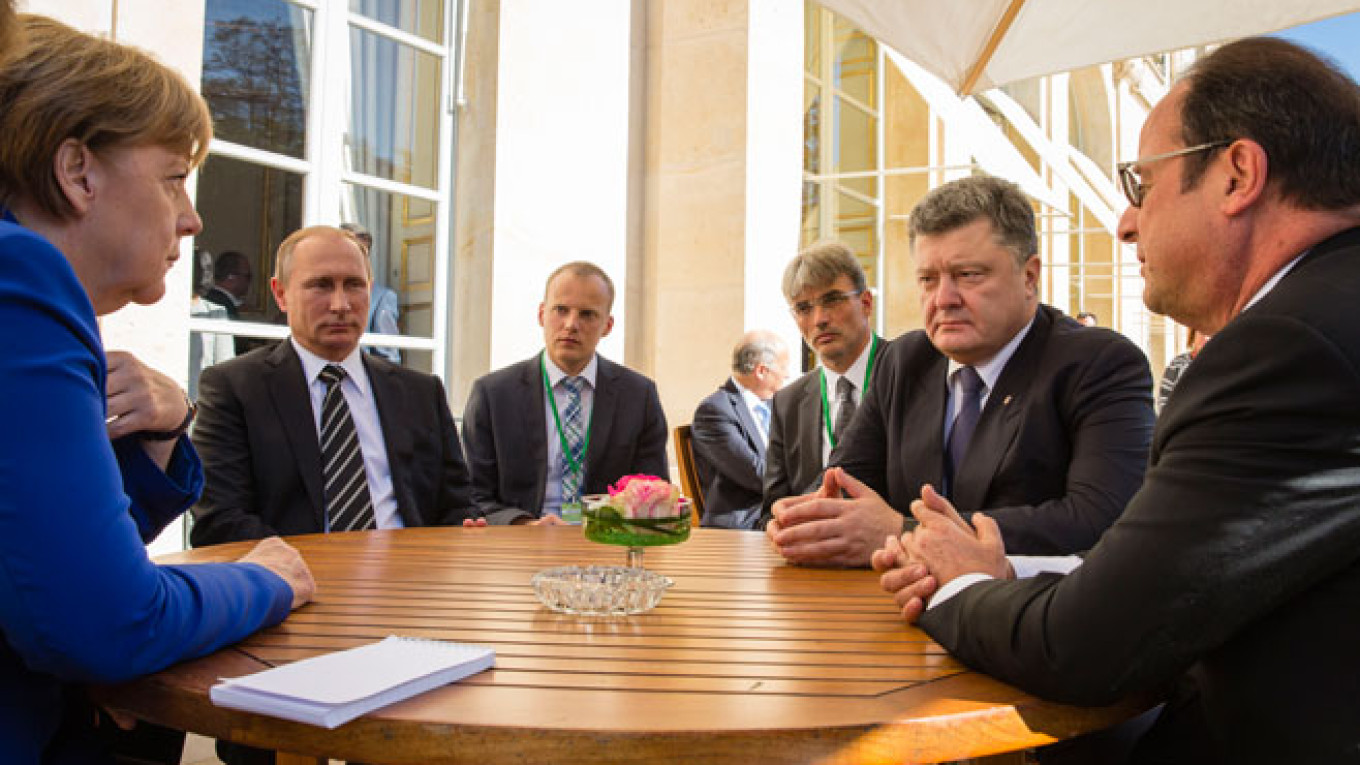A summit reviving a European push to bring peace to eastern Ukraine ended Friday with a call for the delay of contentious rebel plans to hold local elections this month and for both sides to begin a promised withdrawal of smaller-caliber weapons.
Russian President Vladimir Putin met Ukrainian President Petro Poroshenko, French President Francois Hollande and German Chancellor Angela Merkel at a long-awaited summit in Paris that was overshadowed by international concerns about Russia's military intervention in Syria.
The meeting was the first since the leaders worked out a peace deal in Minsk in February. That accord has been troubled, but there have been signs of progress in recent weeks, including a breakthrough agreement last week on withdrawing tanks and many weapons.
After the meeting, Poroshenko said the government side would begin the pullback on Saturday and said it will take 41 days, his press office reported.
Asked whether the pullback agreement, which should effectively alleviate a threat of artillery attacks on civilians, means an end to the war, Poroshenko said: "It means there's a truce. The war will be over when the last piece of the Ukrainian land has been liberated," his office said.
The conflict in Ukraine's industrial heartland between Russian-backed separatists and government troops, which has killed more than 8,000 and displaced 2 million, broke out in April 2014, a month after Russia annexed Ukraine's Crimean Peninsula. Poroshenko's comments on Friday showed that Kiev is not going to compromise on Crimea, which Russia occupied after a hastily called referendum.
The fighting in eastern Ukraine has dwindled significantly in recent weeks, but tensions remain over the final status of the rebel regions. A particular concern is over a dispute about regional elections planned for Oct. 25 and other elections the rebels are proposing for Oct. 18 and Nov. 1.
Hollande said after the summit that the local elections should be organized under the Ukrainian election law, "which means the elections of Oct. 18 cannot be held." He said the elections could be held 90 days after Ukraine passes a law enabling the vote.
The Ukrainian parliament earlier this year passed a law, calling local elections across the country, excluding the east since Ukrainian officials have no access to these areas.
Conducting the vote in rebel-held areas without cooperation with Kiev could among other things pave the way to electoral fraud: When rebel areas elected their leaders last October they had no access to official Ukrainian electoral rolls, meaning that multiple voting was impossible to prevent.
Indicating that the rebels could change their minds soon and agree to a delay, Putin's spokesman Dmitry Peskov told reporters that Putin promised to have an envoy discuss the election issues with rebel leaders.
"Putin certainly could not take on any commitments here, let alone commit to certain terms," he said. "The only thing that the president has promised is to instruct [an envoy] in the next couple of days to talk these things over with the official representatives" of the separatists.
In what could be perceived as a concession for getting the rebels to hold the vote under Ukrainian laws, Kiev should extend an amnesty to those running for office, Peskov said.
Poroshenko's office did not dwell on amnesty and election, two contentious issues in Ukraine, but instead said that the four leaders committed to help observers from the Organization for Security and Cooperation in Europe to get "unhindered access" to all areas in the east, including those sections of the Ukrainian-Russian border which are currently held by the separatists.
Ukraine says as soon as it regains the control of all of its border, it will be able to cut the flow of weapons that have armed the rebels to the teeth.
OSCE observers monitoring the cease-fire in eastern Ukraine have reported over the past few months that heavy weapons have been moved around on both sides of the front line in violation of the February agreement. Just last week, they spotted a Buratino heavy multiple rocket launch system at a rebel training area near the town of Kruhlyk in the separatist-controlled Luhansk region.
"I believe it is the first time we've seen this multiple rocket launch system there," Michael Bociurkiw, spokesman for the OSCE monitoring mission, told The Associated Press. "Of course it's very destructive. It's very indiscriminate in the way it causes damage to the area it hits."
Ukraine does not have the Buratino in its arsenal and believes it could only have been supplied to the rebels by Russia, said Ukrainian General Staff spokesman Vladislav Seleznyov. Russia denies arming the separatists.
The OSCE monitors cannot determine the origin of the Buratino, their spokesman said. Their concern is that, as with all heavy weaponry, its presence close to the front line raises the risk of escalation.
Overall, though, Bociurkiw was optimistic about the peace process, noting that the latest truce has largely held since it began on Sept. 1. "We are now into an unprecedented period … of unprecedented calm," he said.
A Message from The Moscow Times:
Dear readers,
We are facing unprecedented challenges. Russia's Prosecutor General's Office has designated The Moscow Times as an "undesirable" organization, criminalizing our work and putting our staff at risk of prosecution. This follows our earlier unjust labeling as a "foreign agent."
These actions are direct attempts to silence independent journalism in Russia. The authorities claim our work "discredits the decisions of the Russian leadership." We see things differently: we strive to provide accurate, unbiased reporting on Russia.
We, the journalists of The Moscow Times, refuse to be silenced. But to continue our work, we need your help.
Your support, no matter how small, makes a world of difference. If you can, please support us monthly starting from just $2. It's quick to set up, and every contribution makes a significant impact.
By supporting The Moscow Times, you're defending open, independent journalism in the face of repression. Thank you for standing with us.
Remind me later.


